MGBBT1TEN - Sustainable Tourism, Stakeholders & UK PESTLE Analysis
VerifiedAdded on 2023/06/07
|9
|2830
|278
Essay
AI Summary
This essay provides a comprehensive analysis of sustainable tourism in the UK, examining the concept, principles, and the roles of stakeholders in decision-making within the tourism industry. It delves into the macro-environmental factors influencing sustainable development, utilizing PESTLE analysis to highlight political, economic, social, technological, legal, and environmental impacts. Additionally, the essay explores micro-environmental factors such as suppliers, customers, resellers, and competition, assessing their influence on the demand for tourism products. The conclusion summarizes the importance of sustainable tourism development, emphasizing the maximization of benefits while minimizing costs to natural environments and local communities, and underscores the significance of stakeholder involvement and a stable political environment in the UK for fostering a thriving tourism industry.
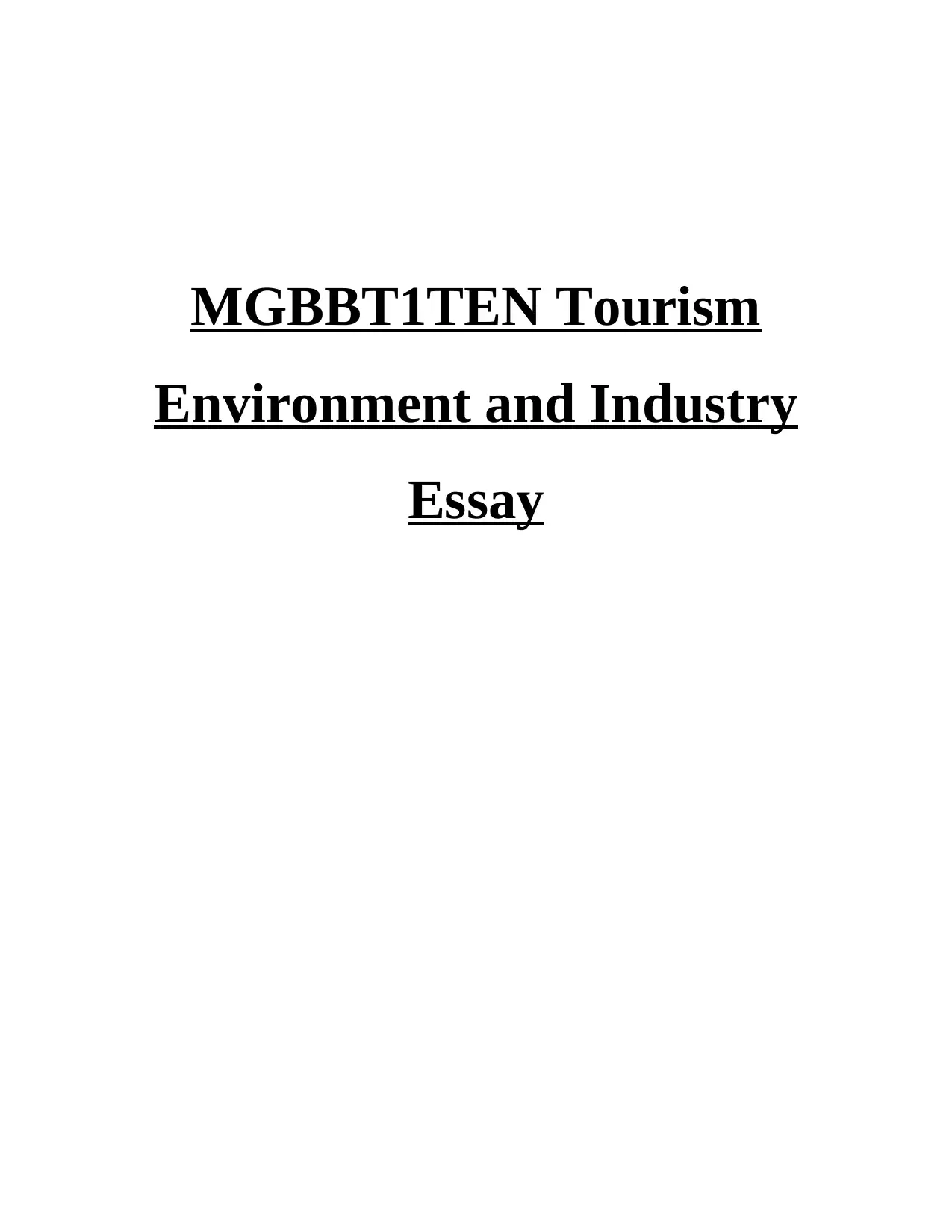
MGBBT1TEN Tourism
Environment and Industry
Essay
Environment and Industry
Essay
Paraphrase This Document
Need a fresh take? Get an instant paraphrase of this document with our AI Paraphraser
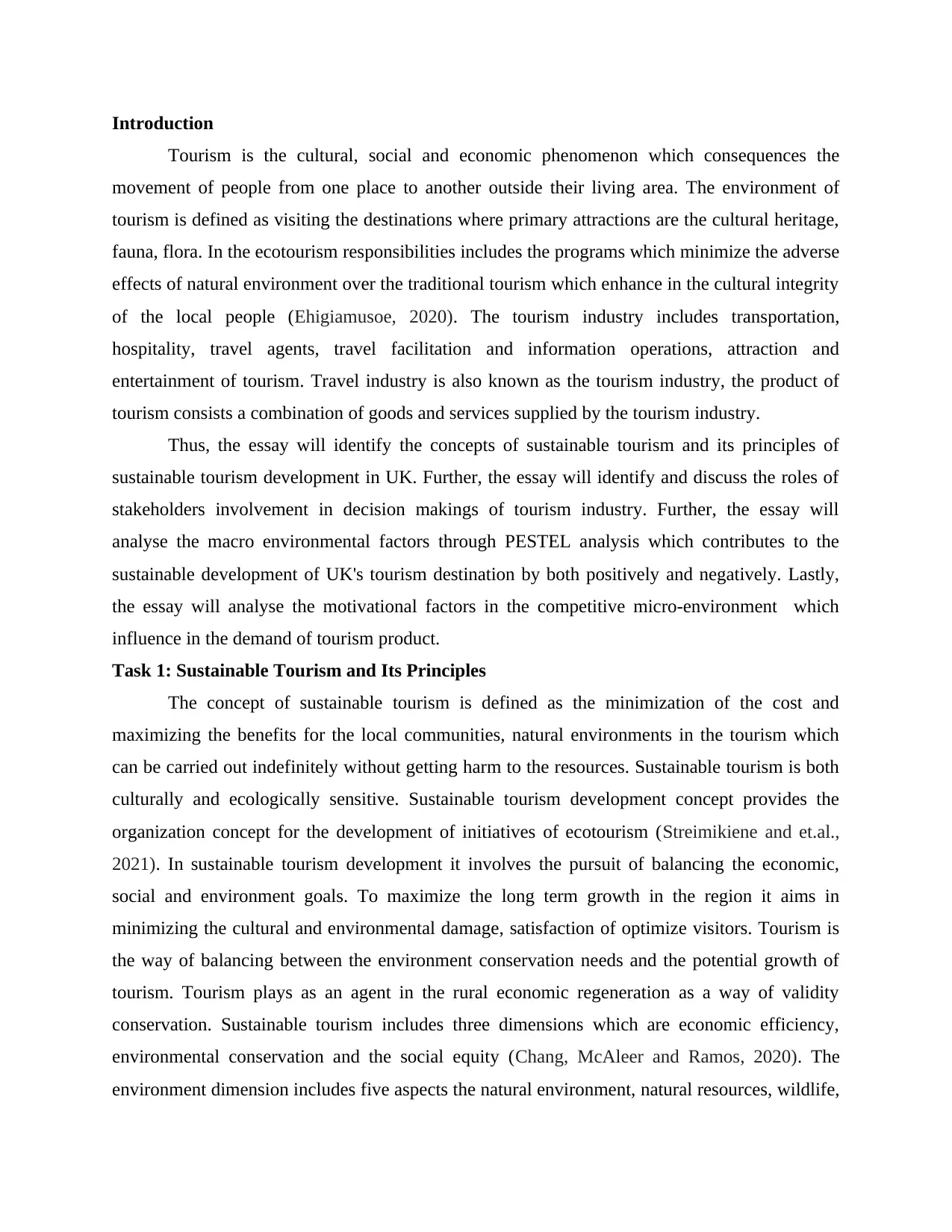
Introduction
Tourism is the cultural, social and economic phenomenon which consequences the
movement of people from one place to another outside their living area. The environment of
tourism is defined as visiting the destinations where primary attractions are the cultural heritage,
fauna, flora. In the ecotourism responsibilities includes the programs which minimize the adverse
effects of natural environment over the traditional tourism which enhance in the cultural integrity
of the local people (Ehigiamusoe, 2020). The tourism industry includes transportation,
hospitality, travel agents, travel facilitation and information operations, attraction and
entertainment of tourism. Travel industry is also known as the tourism industry, the product of
tourism consists a combination of goods and services supplied by the tourism industry.
Thus, the essay will identify the concepts of sustainable tourism and its principles of
sustainable tourism development in UK. Further, the essay will identify and discuss the roles of
stakeholders involvement in decision makings of tourism industry. Further, the essay will
analyse the macro environmental factors through PESTEL analysis which contributes to the
sustainable development of UK's tourism destination by both positively and negatively. Lastly,
the essay will analyse the motivational factors in the competitive micro-environment which
influence in the demand of tourism product.
Task 1: Sustainable Tourism and Its Principles
The concept of sustainable tourism is defined as the minimization of the cost and
maximizing the benefits for the local communities, natural environments in the tourism which
can be carried out indefinitely without getting harm to the resources. Sustainable tourism is both
culturally and ecologically sensitive. Sustainable tourism development concept provides the
organization concept for the development of initiatives of ecotourism (Streimikiene and et.al.,
2021). In sustainable tourism development it involves the pursuit of balancing the economic,
social and environment goals. To maximize the long term growth in the region it aims in
minimizing the cultural and environmental damage, satisfaction of optimize visitors. Tourism is
the way of balancing between the environment conservation needs and the potential growth of
tourism. Tourism plays as an agent in the rural economic regeneration as a way of validity
conservation. Sustainable tourism includes three dimensions which are economic efficiency,
environmental conservation and the social equity (Chang, McAleer and Ramos, 2020). The
environment dimension includes five aspects the natural environment, natural resources, wildlife,
Tourism is the cultural, social and economic phenomenon which consequences the
movement of people from one place to another outside their living area. The environment of
tourism is defined as visiting the destinations where primary attractions are the cultural heritage,
fauna, flora. In the ecotourism responsibilities includes the programs which minimize the adverse
effects of natural environment over the traditional tourism which enhance in the cultural integrity
of the local people (Ehigiamusoe, 2020). The tourism industry includes transportation,
hospitality, travel agents, travel facilitation and information operations, attraction and
entertainment of tourism. Travel industry is also known as the tourism industry, the product of
tourism consists a combination of goods and services supplied by the tourism industry.
Thus, the essay will identify the concepts of sustainable tourism and its principles of
sustainable tourism development in UK. Further, the essay will identify and discuss the roles of
stakeholders involvement in decision makings of tourism industry. Further, the essay will
analyse the macro environmental factors through PESTEL analysis which contributes to the
sustainable development of UK's tourism destination by both positively and negatively. Lastly,
the essay will analyse the motivational factors in the competitive micro-environment which
influence in the demand of tourism product.
Task 1: Sustainable Tourism and Its Principles
The concept of sustainable tourism is defined as the minimization of the cost and
maximizing the benefits for the local communities, natural environments in the tourism which
can be carried out indefinitely without getting harm to the resources. Sustainable tourism is both
culturally and ecologically sensitive. Sustainable tourism development concept provides the
organization concept for the development of initiatives of ecotourism (Streimikiene and et.al.,
2021). In sustainable tourism development it involves the pursuit of balancing the economic,
social and environment goals. To maximize the long term growth in the region it aims in
minimizing the cultural and environmental damage, satisfaction of optimize visitors. Tourism is
the way of balancing between the environment conservation needs and the potential growth of
tourism. Tourism plays as an agent in the rural economic regeneration as a way of validity
conservation. Sustainable tourism includes three dimensions which are economic efficiency,
environmental conservation and the social equity (Chang, McAleer and Ramos, 2020). The
environment dimension includes five aspects the natural environment, natural resources, wildlife,
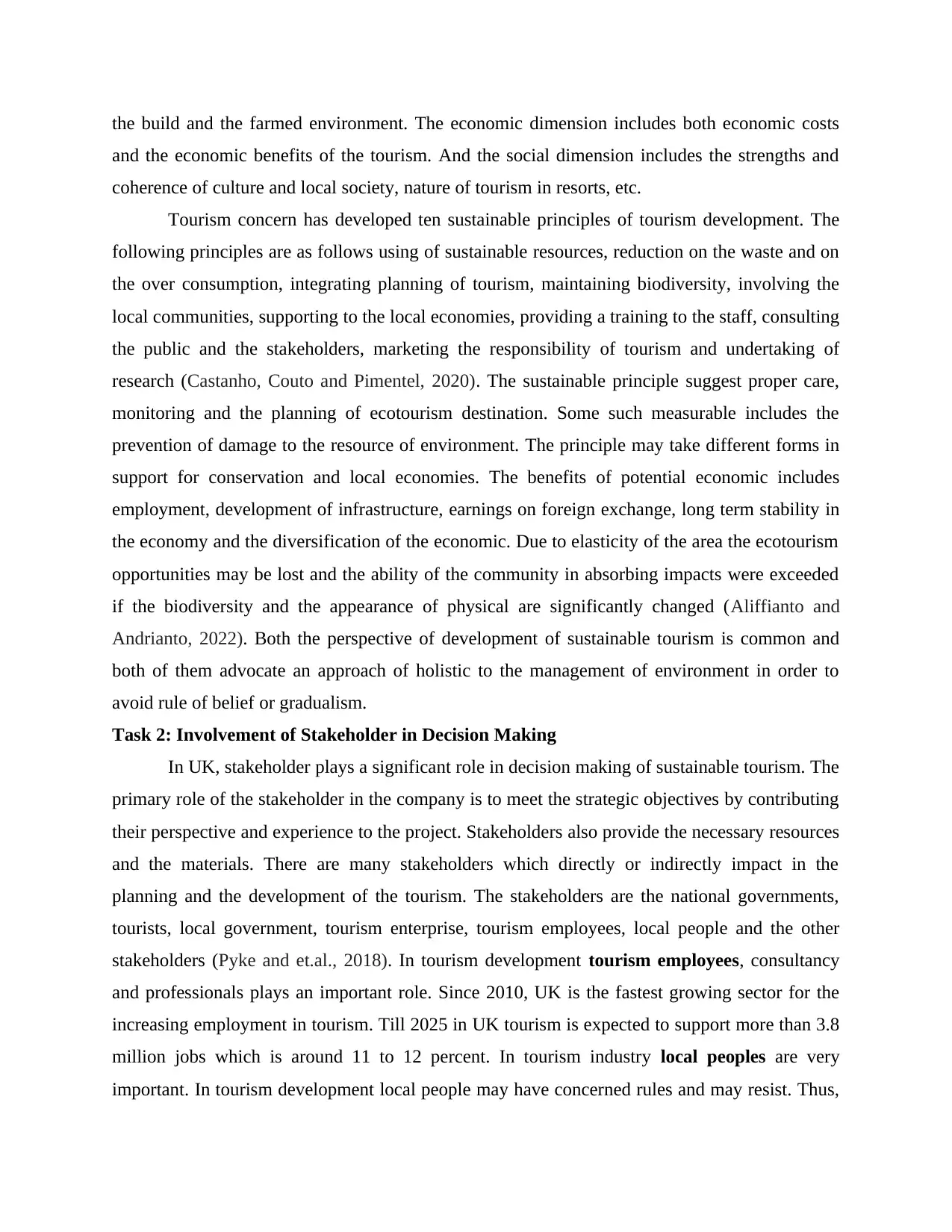
the build and the farmed environment. The economic dimension includes both economic costs
and the economic benefits of the tourism. And the social dimension includes the strengths and
coherence of culture and local society, nature of tourism in resorts, etc.
Tourism concern has developed ten sustainable principles of tourism development. The
following principles are as follows using of sustainable resources, reduction on the waste and on
the over consumption, integrating planning of tourism, maintaining biodiversity, involving the
local communities, supporting to the local economies, providing a training to the staff, consulting
the public and the stakeholders, marketing the responsibility of tourism and undertaking of
research (Castanho, Couto and Pimentel, 2020). The sustainable principle suggest proper care,
monitoring and the planning of ecotourism destination. Some such measurable includes the
prevention of damage to the resource of environment. The principle may take different forms in
support for conservation and local economies. The benefits of potential economic includes
employment, development of infrastructure, earnings on foreign exchange, long term stability in
the economy and the diversification of the economic. Due to elasticity of the area the ecotourism
opportunities may be lost and the ability of the community in absorbing impacts were exceeded
if the biodiversity and the appearance of physical are significantly changed (Aliffianto and
Andrianto, 2022). Both the perspective of development of sustainable tourism is common and
both of them advocate an approach of holistic to the management of environment in order to
avoid rule of belief or gradualism.
Task 2: Involvement of Stakeholder in Decision Making
In UK, stakeholder plays a significant role in decision making of sustainable tourism. The
primary role of the stakeholder in the company is to meet the strategic objectives by contributing
their perspective and experience to the project. Stakeholders also provide the necessary resources
and the materials. There are many stakeholders which directly or indirectly impact in the
planning and the development of the tourism. The stakeholders are the national governments,
tourists, local government, tourism enterprise, tourism employees, local people and the other
stakeholders (Pyke and et.al., 2018). In tourism development tourism employees, consultancy
and professionals plays an important role. Since 2010, UK is the fastest growing sector for the
increasing employment in tourism. Till 2025 in UK tourism is expected to support more than 3.8
million jobs which is around 11 to 12 percent. In tourism industry local peoples are very
important. In tourism development local people may have concerned rules and may resist. Thus,
and the economic benefits of the tourism. And the social dimension includes the strengths and
coherence of culture and local society, nature of tourism in resorts, etc.
Tourism concern has developed ten sustainable principles of tourism development. The
following principles are as follows using of sustainable resources, reduction on the waste and on
the over consumption, integrating planning of tourism, maintaining biodiversity, involving the
local communities, supporting to the local economies, providing a training to the staff, consulting
the public and the stakeholders, marketing the responsibility of tourism and undertaking of
research (Castanho, Couto and Pimentel, 2020). The sustainable principle suggest proper care,
monitoring and the planning of ecotourism destination. Some such measurable includes the
prevention of damage to the resource of environment. The principle may take different forms in
support for conservation and local economies. The benefits of potential economic includes
employment, development of infrastructure, earnings on foreign exchange, long term stability in
the economy and the diversification of the economic. Due to elasticity of the area the ecotourism
opportunities may be lost and the ability of the community in absorbing impacts were exceeded
if the biodiversity and the appearance of physical are significantly changed (Aliffianto and
Andrianto, 2022). Both the perspective of development of sustainable tourism is common and
both of them advocate an approach of holistic to the management of environment in order to
avoid rule of belief or gradualism.
Task 2: Involvement of Stakeholder in Decision Making
In UK, stakeholder plays a significant role in decision making of sustainable tourism. The
primary role of the stakeholder in the company is to meet the strategic objectives by contributing
their perspective and experience to the project. Stakeholders also provide the necessary resources
and the materials. There are many stakeholders which directly or indirectly impact in the
planning and the development of the tourism. The stakeholders are the national governments,
tourists, local government, tourism enterprise, tourism employees, local people and the other
stakeholders (Pyke and et.al., 2018). In tourism development tourism employees, consultancy
and professionals plays an important role. Since 2010, UK is the fastest growing sector for the
increasing employment in tourism. Till 2025 in UK tourism is expected to support more than 3.8
million jobs which is around 11 to 12 percent. In tourism industry local peoples are very
important. In tourism development local people may have concerned rules and may resist. Thus,
⊘ This is a preview!⊘
Do you want full access?
Subscribe today to unlock all pages.

Trusted by 1+ million students worldwide
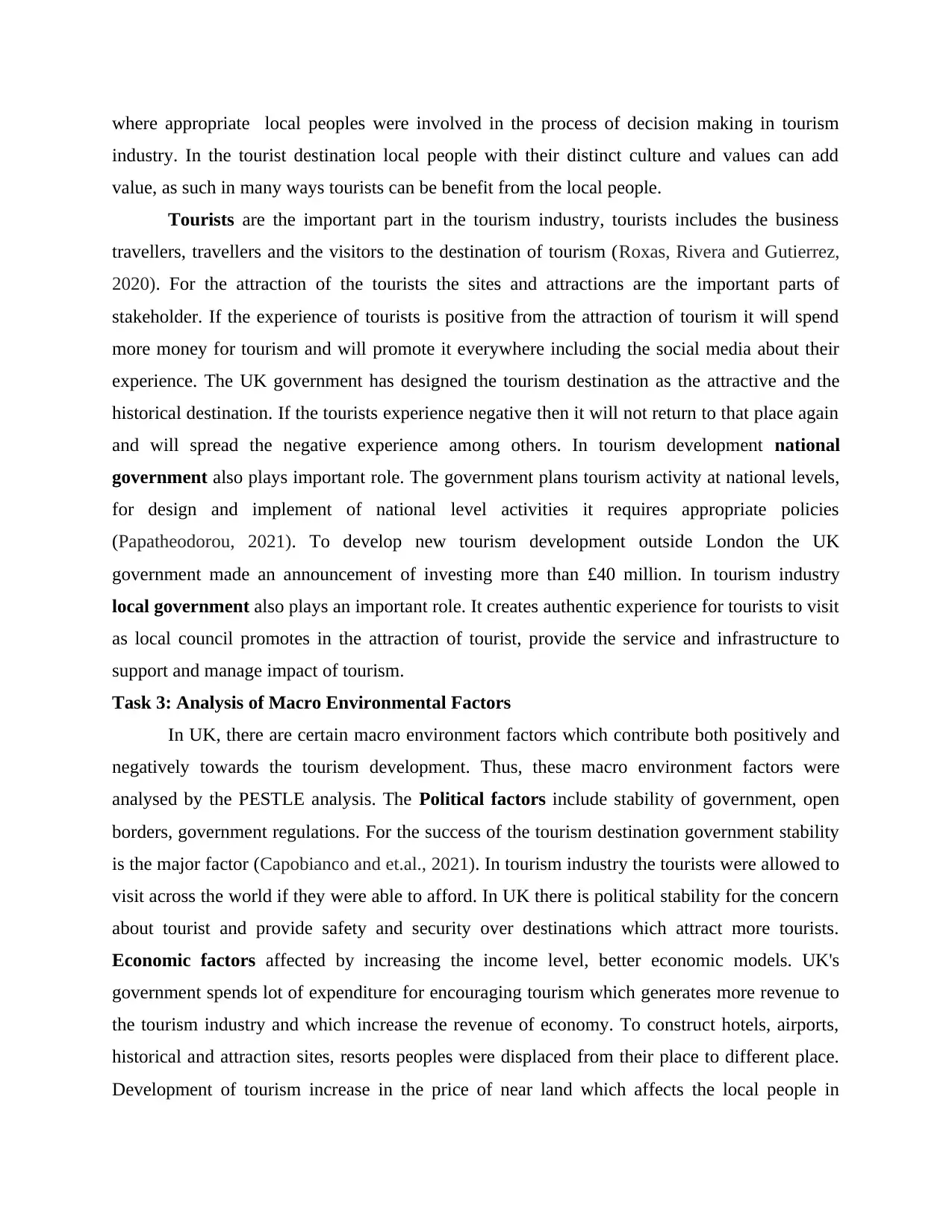
where appropriate local peoples were involved in the process of decision making in tourism
industry. In the tourist destination local people with their distinct culture and values can add
value, as such in many ways tourists can be benefit from the local people.
Tourists are the important part in the tourism industry, tourists includes the business
travellers, travellers and the visitors to the destination of tourism (Roxas, Rivera and Gutierrez,
2020). For the attraction of the tourists the sites and attractions are the important parts of
stakeholder. If the experience of tourists is positive from the attraction of tourism it will spend
more money for tourism and will promote it everywhere including the social media about their
experience. The UK government has designed the tourism destination as the attractive and the
historical destination. If the tourists experience negative then it will not return to that place again
and will spread the negative experience among others. In tourism development national
government also plays important role. The government plans tourism activity at national levels,
for design and implement of national level activities it requires appropriate policies
(Papatheodorou, 2021). To develop new tourism development outside London the UK
government made an announcement of investing more than £40 million. In tourism industry
local government also plays an important role. It creates authentic experience for tourists to visit
as local council promotes in the attraction of tourist, provide the service and infrastructure to
support and manage impact of tourism.
Task 3: Analysis of Macro Environmental Factors
In UK, there are certain macro environment factors which contribute both positively and
negatively towards the tourism development. Thus, these macro environment factors were
analysed by the PESTLE analysis. The Political factors include stability of government, open
borders, government regulations. For the success of the tourism destination government stability
is the major factor (Capobianco and et.al., 2021). In tourism industry the tourists were allowed to
visit across the world if they were able to afford. In UK there is political stability for the concern
about tourist and provide safety and security over destinations which attract more tourists.
Economic factors affected by increasing the income level, better economic models. UK's
government spends lot of expenditure for encouraging tourism which generates more revenue to
the tourism industry and which increase the revenue of economy. To construct hotels, airports,
historical and attraction sites, resorts peoples were displaced from their place to different place.
Development of tourism increase in the price of near land which affects the local people in
industry. In the tourist destination local people with their distinct culture and values can add
value, as such in many ways tourists can be benefit from the local people.
Tourists are the important part in the tourism industry, tourists includes the business
travellers, travellers and the visitors to the destination of tourism (Roxas, Rivera and Gutierrez,
2020). For the attraction of the tourists the sites and attractions are the important parts of
stakeholder. If the experience of tourists is positive from the attraction of tourism it will spend
more money for tourism and will promote it everywhere including the social media about their
experience. The UK government has designed the tourism destination as the attractive and the
historical destination. If the tourists experience negative then it will not return to that place again
and will spread the negative experience among others. In tourism development national
government also plays important role. The government plans tourism activity at national levels,
for design and implement of national level activities it requires appropriate policies
(Papatheodorou, 2021). To develop new tourism development outside London the UK
government made an announcement of investing more than £40 million. In tourism industry
local government also plays an important role. It creates authentic experience for tourists to visit
as local council promotes in the attraction of tourist, provide the service and infrastructure to
support and manage impact of tourism.
Task 3: Analysis of Macro Environmental Factors
In UK, there are certain macro environment factors which contribute both positively and
negatively towards the tourism development. Thus, these macro environment factors were
analysed by the PESTLE analysis. The Political factors include stability of government, open
borders, government regulations. For the success of the tourism destination government stability
is the major factor (Capobianco and et.al., 2021). In tourism industry the tourists were allowed to
visit across the world if they were able to afford. In UK there is political stability for the concern
about tourist and provide safety and security over destinations which attract more tourists.
Economic factors affected by increasing the income level, better economic models. UK's
government spends lot of expenditure for encouraging tourism which generates more revenue to
the tourism industry and which increase the revenue of economy. To construct hotels, airports,
historical and attraction sites, resorts peoples were displaced from their place to different place.
Development of tourism increase in the price of near land which affects the local people in
Paraphrase This Document
Need a fresh take? Get an instant paraphrase of this document with our AI Paraphraser
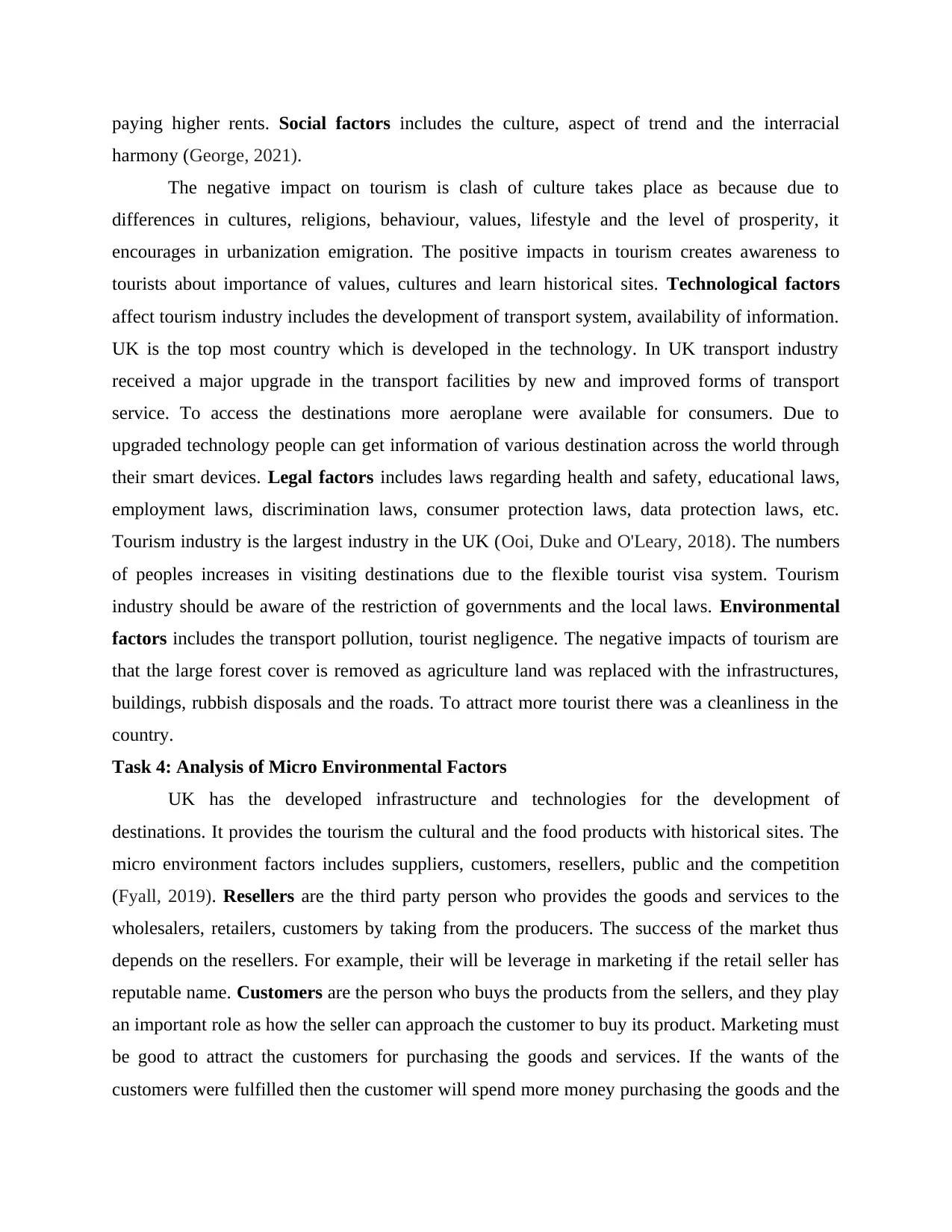
paying higher rents. Social factors includes the culture, aspect of trend and the interracial
harmony (George, 2021).
The negative impact on tourism is clash of culture takes place as because due to
differences in cultures, religions, behaviour, values, lifestyle and the level of prosperity, it
encourages in urbanization emigration. The positive impacts in tourism creates awareness to
tourists about importance of values, cultures and learn historical sites. Technological factors
affect tourism industry includes the development of transport system, availability of information.
UK is the top most country which is developed in the technology. In UK transport industry
received a major upgrade in the transport facilities by new and improved forms of transport
service. To access the destinations more aeroplane were available for consumers. Due to
upgraded technology people can get information of various destination across the world through
their smart devices. Legal factors includes laws regarding health and safety, educational laws,
employment laws, discrimination laws, consumer protection laws, data protection laws, etc.
Tourism industry is the largest industry in the UK (Ooi, Duke and O'Leary, 2018). The numbers
of peoples increases in visiting destinations due to the flexible tourist visa system. Tourism
industry should be aware of the restriction of governments and the local laws. Environmental
factors includes the transport pollution, tourist negligence. The negative impacts of tourism are
that the large forest cover is removed as agriculture land was replaced with the infrastructures,
buildings, rubbish disposals and the roads. To attract more tourist there was a cleanliness in the
country.
Task 4: Analysis of Micro Environmental Factors
UK has the developed infrastructure and technologies for the development of
destinations. It provides the tourism the cultural and the food products with historical sites. The
micro environment factors includes suppliers, customers, resellers, public and the competition
(Fyall, 2019). Resellers are the third party person who provides the goods and services to the
wholesalers, retailers, customers by taking from the producers. The success of the market thus
depends on the resellers. For example, their will be leverage in marketing if the retail seller has
reputable name. Customers are the person who buys the products from the sellers, and they play
an important role as how the seller can approach the customer to buy its product. Marketing must
be good to attract the customers for purchasing the goods and services. If the wants of the
customers were fulfilled then the customer will spend more money purchasing the goods and the
harmony (George, 2021).
The negative impact on tourism is clash of culture takes place as because due to
differences in cultures, religions, behaviour, values, lifestyle and the level of prosperity, it
encourages in urbanization emigration. The positive impacts in tourism creates awareness to
tourists about importance of values, cultures and learn historical sites. Technological factors
affect tourism industry includes the development of transport system, availability of information.
UK is the top most country which is developed in the technology. In UK transport industry
received a major upgrade in the transport facilities by new and improved forms of transport
service. To access the destinations more aeroplane were available for consumers. Due to
upgraded technology people can get information of various destination across the world through
their smart devices. Legal factors includes laws regarding health and safety, educational laws,
employment laws, discrimination laws, consumer protection laws, data protection laws, etc.
Tourism industry is the largest industry in the UK (Ooi, Duke and O'Leary, 2018). The numbers
of peoples increases in visiting destinations due to the flexible tourist visa system. Tourism
industry should be aware of the restriction of governments and the local laws. Environmental
factors includes the transport pollution, tourist negligence. The negative impacts of tourism are
that the large forest cover is removed as agriculture land was replaced with the infrastructures,
buildings, rubbish disposals and the roads. To attract more tourist there was a cleanliness in the
country.
Task 4: Analysis of Micro Environmental Factors
UK has the developed infrastructure and technologies for the development of
destinations. It provides the tourism the cultural and the food products with historical sites. The
micro environment factors includes suppliers, customers, resellers, public and the competition
(Fyall, 2019). Resellers are the third party person who provides the goods and services to the
wholesalers, retailers, customers by taking from the producers. The success of the market thus
depends on the resellers. For example, their will be leverage in marketing if the retail seller has
reputable name. Customers are the person who buys the products from the sellers, and they play
an important role as how the seller can approach the customer to buy its product. Marketing must
be good to attract the customers for purchasing the goods and services. If the wants of the
customers were fulfilled then the customer will spend more money purchasing the goods and the
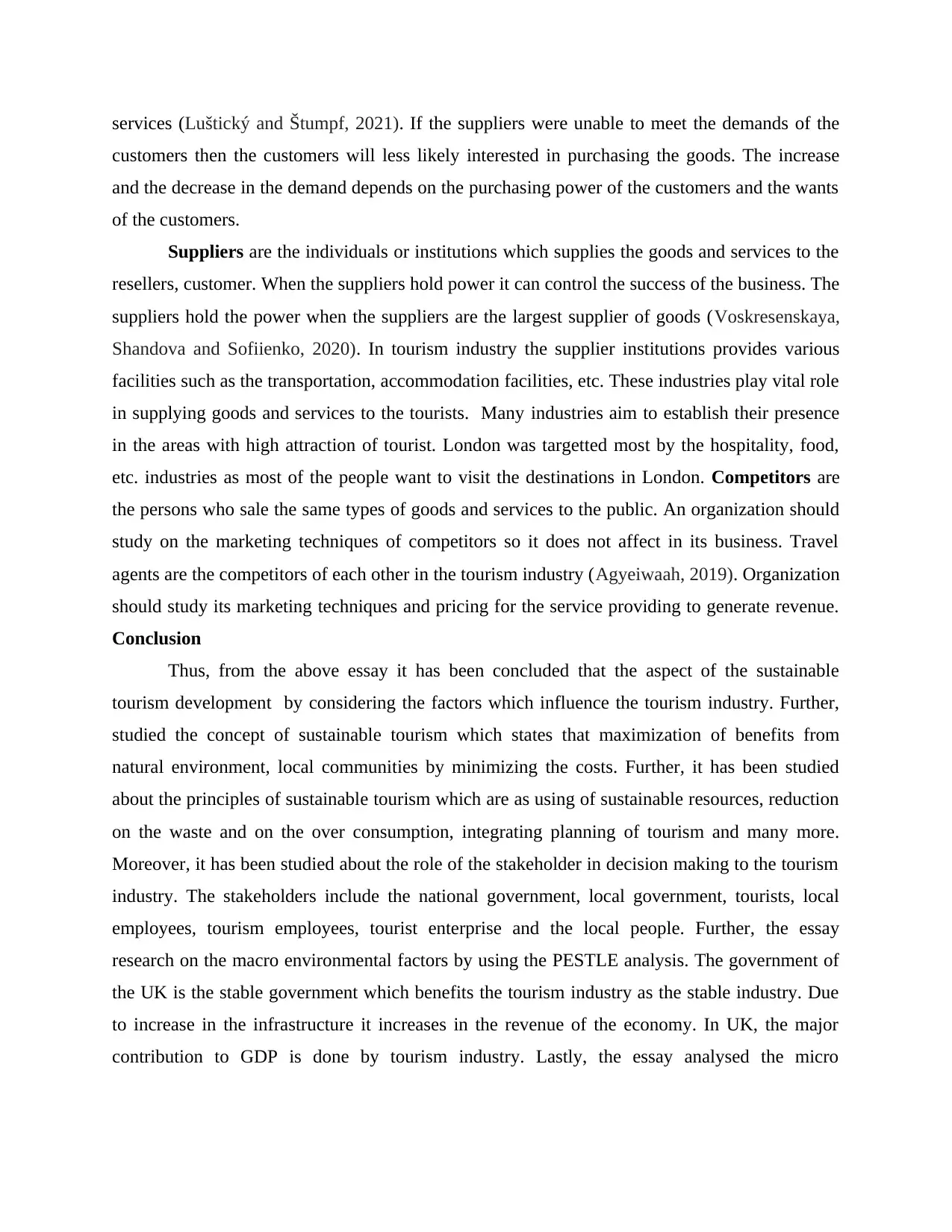
services (Luštický and Štumpf, 2021). If the suppliers were unable to meet the demands of the
customers then the customers will less likely interested in purchasing the goods. The increase
and the decrease in the demand depends on the purchasing power of the customers and the wants
of the customers.
Suppliers are the individuals or institutions which supplies the goods and services to the
resellers, customer. When the suppliers hold power it can control the success of the business. The
suppliers hold the power when the suppliers are the largest supplier of goods (Voskresenskaya,
Shandova and Sofiienko, 2020). In tourism industry the supplier institutions provides various
facilities such as the transportation, accommodation facilities, etc. These industries play vital role
in supplying goods and services to the tourists. Many industries aim to establish their presence
in the areas with high attraction of tourist. London was targetted most by the hospitality, food,
etc. industries as most of the people want to visit the destinations in London. Competitors are
the persons who sale the same types of goods and services to the public. An organization should
study on the marketing techniques of competitors so it does not affect in its business. Travel
agents are the competitors of each other in the tourism industry (Agyeiwaah, 2019). Organization
should study its marketing techniques and pricing for the service providing to generate revenue.
Conclusion
Thus, from the above essay it has been concluded that the aspect of the sustainable
tourism development by considering the factors which influence the tourism industry. Further,
studied the concept of sustainable tourism which states that maximization of benefits from
natural environment, local communities by minimizing the costs. Further, it has been studied
about the principles of sustainable tourism which are as using of sustainable resources, reduction
on the waste and on the over consumption, integrating planning of tourism and many more.
Moreover, it has been studied about the role of the stakeholder in decision making to the tourism
industry. The stakeholders include the national government, local government, tourists, local
employees, tourism employees, tourist enterprise and the local people. Further, the essay
research on the macro environmental factors by using the PESTLE analysis. The government of
the UK is the stable government which benefits the tourism industry as the stable industry. Due
to increase in the infrastructure it increases in the revenue of the economy. In UK, the major
contribution to GDP is done by tourism industry. Lastly, the essay analysed the micro
customers then the customers will less likely interested in purchasing the goods. The increase
and the decrease in the demand depends on the purchasing power of the customers and the wants
of the customers.
Suppliers are the individuals or institutions which supplies the goods and services to the
resellers, customer. When the suppliers hold power it can control the success of the business. The
suppliers hold the power when the suppliers are the largest supplier of goods (Voskresenskaya,
Shandova and Sofiienko, 2020). In tourism industry the supplier institutions provides various
facilities such as the transportation, accommodation facilities, etc. These industries play vital role
in supplying goods and services to the tourists. Many industries aim to establish their presence
in the areas with high attraction of tourist. London was targetted most by the hospitality, food,
etc. industries as most of the people want to visit the destinations in London. Competitors are
the persons who sale the same types of goods and services to the public. An organization should
study on the marketing techniques of competitors so it does not affect in its business. Travel
agents are the competitors of each other in the tourism industry (Agyeiwaah, 2019). Organization
should study its marketing techniques and pricing for the service providing to generate revenue.
Conclusion
Thus, from the above essay it has been concluded that the aspect of the sustainable
tourism development by considering the factors which influence the tourism industry. Further,
studied the concept of sustainable tourism which states that maximization of benefits from
natural environment, local communities by minimizing the costs. Further, it has been studied
about the principles of sustainable tourism which are as using of sustainable resources, reduction
on the waste and on the over consumption, integrating planning of tourism and many more.
Moreover, it has been studied about the role of the stakeholder in decision making to the tourism
industry. The stakeholders include the national government, local government, tourists, local
employees, tourism employees, tourist enterprise and the local people. Further, the essay
research on the macro environmental factors by using the PESTLE analysis. The government of
the UK is the stable government which benefits the tourism industry as the stable industry. Due
to increase in the infrastructure it increases in the revenue of the economy. In UK, the major
contribution to GDP is done by tourism industry. Lastly, the essay analysed the micro
⊘ This is a preview!⊘
Do you want full access?
Subscribe today to unlock all pages.

Trusted by 1+ million students worldwide

environment factors which are the suppliers, competitors, consumers, etc. These factors effect on
the demand of tourism product which is the food products and the culture.
the demand of tourism product which is the food products and the culture.
Paraphrase This Document
Need a fresh take? Get an instant paraphrase of this document with our AI Paraphraser
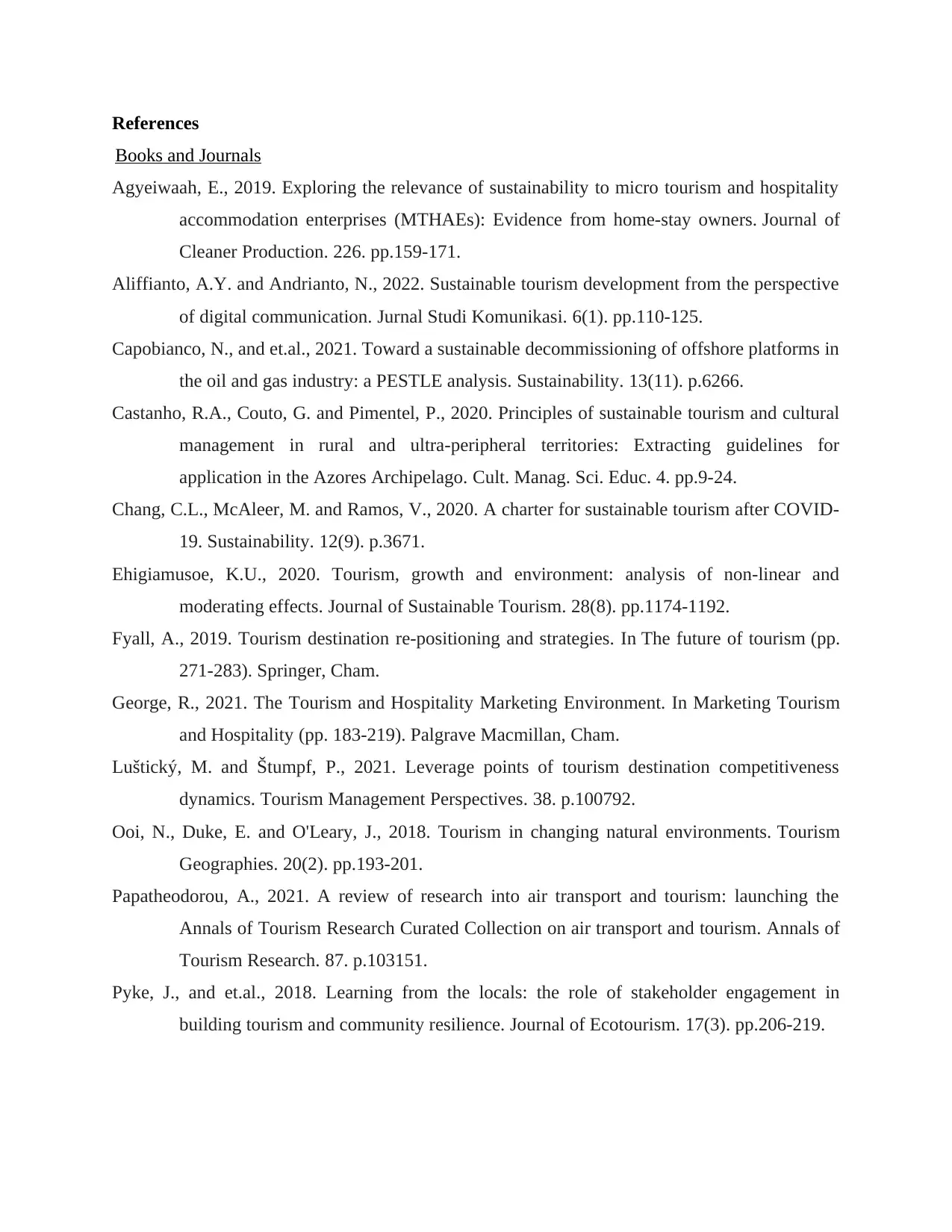
References
Books and Journals
Agyeiwaah, E., 2019. Exploring the relevance of sustainability to micro tourism and hospitality
accommodation enterprises (MTHAEs): Evidence from home-stay owners. Journal of
Cleaner Production. 226. pp.159-171.
Aliffianto, A.Y. and Andrianto, N., 2022. Sustainable tourism development from the perspective
of digital communication. Jurnal Studi Komunikasi. 6(1). pp.110-125.
Capobianco, N., and et.al., 2021. Toward a sustainable decommissioning of offshore platforms in
the oil and gas industry: a PESTLE analysis. Sustainability. 13(11). p.6266.
Castanho, R.A., Couto, G. and Pimentel, P., 2020. Principles of sustainable tourism and cultural
management in rural and ultra-peripheral territories: Extracting guidelines for
application in the Azores Archipelago. Cult. Manag. Sci. Educ. 4. pp.9-24.
Chang, C.L., McAleer, M. and Ramos, V., 2020. A charter for sustainable tourism after COVID-
19. Sustainability. 12(9). p.3671.
Ehigiamusoe, K.U., 2020. Tourism, growth and environment: analysis of non-linear and
moderating effects. Journal of Sustainable Tourism. 28(8). pp.1174-1192.
Fyall, A., 2019. Tourism destination re-positioning and strategies. In The future of tourism (pp.
271-283). Springer, Cham.
George, R., 2021. The Tourism and Hospitality Marketing Environment. In Marketing Tourism
and Hospitality (pp. 183-219). Palgrave Macmillan, Cham.
Luštický, M. and Štumpf, P., 2021. Leverage points of tourism destination competitiveness
dynamics. Tourism Management Perspectives. 38. p.100792.
Ooi, N., Duke, E. and O'Leary, J., 2018. Tourism in changing natural environments. Tourism
Geographies. 20(2). pp.193-201.
Papatheodorou, A., 2021. A review of research into air transport and tourism: launching the
Annals of Tourism Research Curated Collection on air transport and tourism. Annals of
Tourism Research. 87. p.103151.
Pyke, J., and et.al., 2018. Learning from the locals: the role of stakeholder engagement in
building tourism and community resilience. Journal of Ecotourism. 17(3). pp.206-219.
Books and Journals
Agyeiwaah, E., 2019. Exploring the relevance of sustainability to micro tourism and hospitality
accommodation enterprises (MTHAEs): Evidence from home-stay owners. Journal of
Cleaner Production. 226. pp.159-171.
Aliffianto, A.Y. and Andrianto, N., 2022. Sustainable tourism development from the perspective
of digital communication. Jurnal Studi Komunikasi. 6(1). pp.110-125.
Capobianco, N., and et.al., 2021. Toward a sustainable decommissioning of offshore platforms in
the oil and gas industry: a PESTLE analysis. Sustainability. 13(11). p.6266.
Castanho, R.A., Couto, G. and Pimentel, P., 2020. Principles of sustainable tourism and cultural
management in rural and ultra-peripheral territories: Extracting guidelines for
application in the Azores Archipelago. Cult. Manag. Sci. Educ. 4. pp.9-24.
Chang, C.L., McAleer, M. and Ramos, V., 2020. A charter for sustainable tourism after COVID-
19. Sustainability. 12(9). p.3671.
Ehigiamusoe, K.U., 2020. Tourism, growth and environment: analysis of non-linear and
moderating effects. Journal of Sustainable Tourism. 28(8). pp.1174-1192.
Fyall, A., 2019. Tourism destination re-positioning and strategies. In The future of tourism (pp.
271-283). Springer, Cham.
George, R., 2021. The Tourism and Hospitality Marketing Environment. In Marketing Tourism
and Hospitality (pp. 183-219). Palgrave Macmillan, Cham.
Luštický, M. and Štumpf, P., 2021. Leverage points of tourism destination competitiveness
dynamics. Tourism Management Perspectives. 38. p.100792.
Ooi, N., Duke, E. and O'Leary, J., 2018. Tourism in changing natural environments. Tourism
Geographies. 20(2). pp.193-201.
Papatheodorou, A., 2021. A review of research into air transport and tourism: launching the
Annals of Tourism Research Curated Collection on air transport and tourism. Annals of
Tourism Research. 87. p.103151.
Pyke, J., and et.al., 2018. Learning from the locals: the role of stakeholder engagement in
building tourism and community resilience. Journal of Ecotourism. 17(3). pp.206-219.
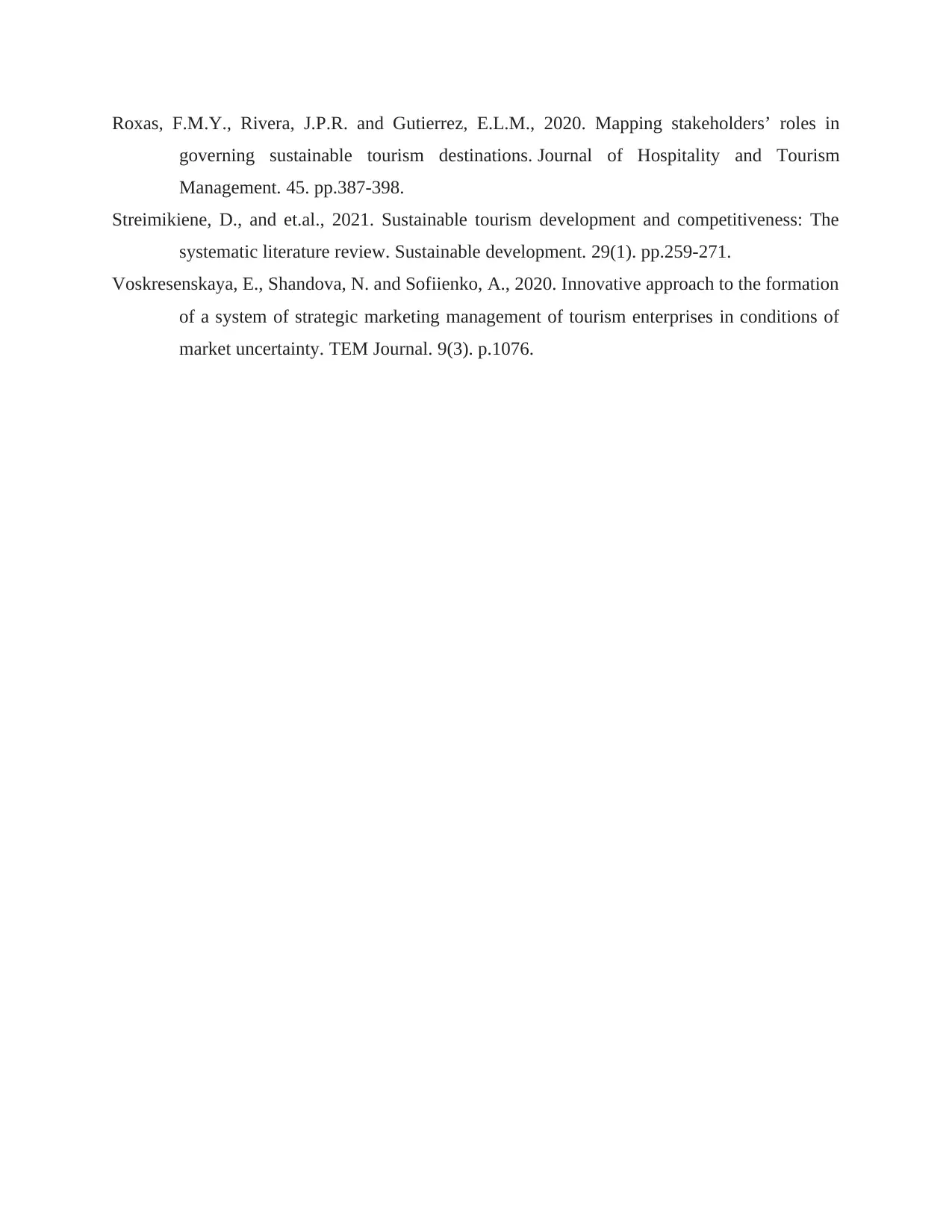
Roxas, F.M.Y., Rivera, J.P.R. and Gutierrez, E.L.M., 2020. Mapping stakeholders’ roles in
governing sustainable tourism destinations. Journal of Hospitality and Tourism
Management. 45. pp.387-398.
Streimikiene, D., and et.al., 2021. Sustainable tourism development and competitiveness: The
systematic literature review. Sustainable development. 29(1). pp.259-271.
Voskresenskaya, E., Shandova, N. and Sofiienko, A., 2020. Innovative approach to the formation
of a system of strategic marketing management of tourism enterprises in conditions of
market uncertainty. TEM Journal. 9(3). p.1076.
governing sustainable tourism destinations. Journal of Hospitality and Tourism
Management. 45. pp.387-398.
Streimikiene, D., and et.al., 2021. Sustainable tourism development and competitiveness: The
systematic literature review. Sustainable development. 29(1). pp.259-271.
Voskresenskaya, E., Shandova, N. and Sofiienko, A., 2020. Innovative approach to the formation
of a system of strategic marketing management of tourism enterprises in conditions of
market uncertainty. TEM Journal. 9(3). p.1076.
⊘ This is a preview!⊘
Do you want full access?
Subscribe today to unlock all pages.

Trusted by 1+ million students worldwide
1 out of 9
Related Documents
Your All-in-One AI-Powered Toolkit for Academic Success.
+13062052269
info@desklib.com
Available 24*7 on WhatsApp / Email
![[object Object]](/_next/static/media/star-bottom.7253800d.svg)
Unlock your academic potential
Copyright © 2020–2026 A2Z Services. All Rights Reserved. Developed and managed by ZUCOL.




